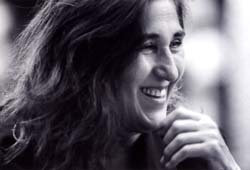
Emine Sevgi Özdamar
- Germany
- Zu Gast beim ilb: 2005
Emine Sevgi Özdamar was born in 1946 in Turkey. As a result of an interest in German theatre she came to Germany as a young adult and worked in a factory in Berlin. Subsequently she studied acting in Istanbul. During the seventies she worked with Brecht’s pupil Benno Besson at the Volksbühne in East Berlin, later in Paris and Avignon. Following that she was a member of the Bochumer Schauspielhaus ensemble led by Claus Peymann, for which she wrote her first play in 1982. »Karagöz in Alamania« (Engl: Blackeye in Germany), also directed by Özdamar, was performed at the Frankfurter Schauspielhaus in 1986. After the publication of her collection of stories »Mutterzunge« (1990; Engl: Mother Tongue) and a further play she was awarded the Ingeborg Bachmann Prize for an excerpt from her first novel. This book was published one year later and met with international critical acclaim.
»Das Leben ist eine Karawanserei – hat zwei Türen – aus einer kam ich rein – aus der anderen ging ich raus« (Engl: Life is a Caravanserai – Has Two Doors – I Came in One – I Went Out the Other, 2000) is an autobiographically inspired novel about a girl’s childhood and adolescence in Turkey in the nineteen fifties and seventies. The family’s frequent moves are formative, just as the archaic lifestyle which is faced with the radical modernisation of the state. Özdamar presents experiences, stories, fantasies, myths and dreams in a strongly sensitive but unsentimental fashion. She binds together Anatolia’s culture with modern discourses and contemporary politics with a fast pace narration. Özdamar characteristically works with the phonetic and figurative aspects of the German language, thereby inserting oriental influences and her very own speech patterns, to develop a novel poetic idiom. »A radical recovery of the animistic visual, of picture linguistics, of the linguistic picture, … the return of imagination to the words« admires Wolfram Schütte in his laudation for the award of the »LiteraTour Nord« prize.
The successive works »Die Brücke vom Goldenen Horn« (1998; Engl: The Bridge of the Golden Horn) and »Seltsame Sterne starren zur Erde« (2003; Engl: Strange Stars Stare at Earth) reflect on the 1968 era in both Turkey and Germany until the German Autumn. In her country, which was plagued by a situation similar to civil war, Özdamar was afflicted with a reluctance to use her native language. She flew to Germany. In the friendly and intensive atmosphere of the theatre she got to know German words that she later used for writing. »I have become happy living with the German language. Maybe that’s why I write in German.«
Alongside her theatre performances, Özdamar also acted in several plays. She is well known for her roles in »Yasemin« by Hark Bohm and »Happy Birthday, Türke« (Engl: Happy Birthday, Turk) by Dorris Dörrie among others. Özdamar has been awarded many prizes for her written work including the Adelbert von Chamisso Prize (1999) and the Kleist Prize (2004). In 2003 she was the offical writer in residence of Bergen-Enkheim. Since May 2007 she is member of the German Academy for Language and Poetry. Özdamar lives in Berlin.
© international literature festival berlin
Karagöz in Alamania
Verlag der Autoren
Frankfurt/Main, 1982
Mutterzunge
Rotbuch
Berlin, 1990
Keloglan in Alamania
Verlag der Autoren
Frankfurt/Main, 1991
Das Leben ist eine Karawanserei, hat zwei Türen, aus einer kam ich rein, aus der anderen ging ich raus
Kiepenheuer & Witsch
Köln, 1992
Die Brücke vom Goldenen Horn
Kiepenheuer & Witsch
Köln, 1998
Verlag der Autoren
Frankfurt/Main, 2001
Der Hof im Spiegel
Kiepenheuer & Witsch
Köln, 2001
Seltsame Sterne starren zur Erde
Kiepenheuer & Witsch
Köln, 2003
